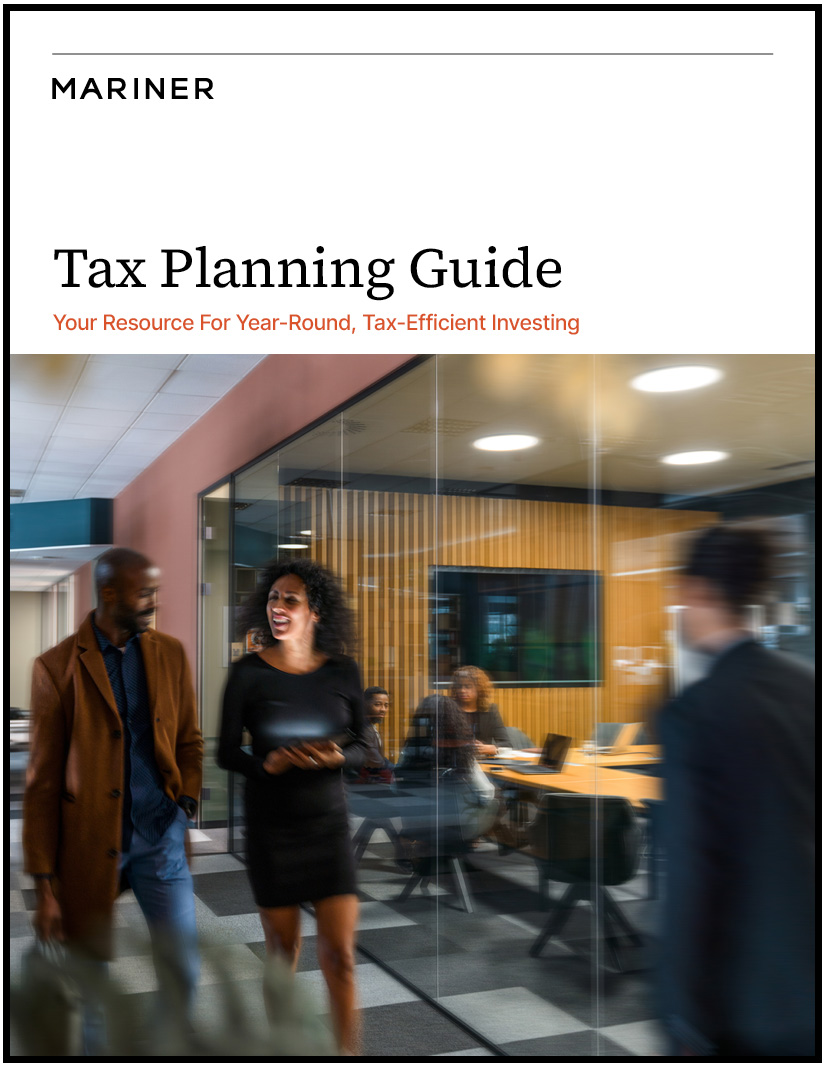Estate Planning Strategies to Consider Ahead of Biden’s Potential Tax Changes

President Biden’s proposed tax policy includes potential changes to estate and gift tax as well as capital gains tax laws. This summary highlights a few of his proposed changes and offers estate planning strategies you might want to discuss proactively with your wealth team.
Proposed Reduction of Federal Estate & Gift Tax Exemption
The 2021 lifetime estate and gift tax exemption amounts is $11.7 million per person (double that for a married couple). That means that an individual can leave $11.7 million to heirs without paying federal estate or gift tax, and a married couple can leave $23.4 million to heirs without owing federal tax.
While there’s no guarantee any of his proposals will become law, President Biden is proposing that current estate and gift tax exemptions be reduced to their 2009 levels. The proposed estate tax exemption could be lowered from $11.7 million to $3.5 million, and the gift tax exemption could be reduced from $11.7 million to $1 million per individual. Some are concerned that Biden will accelerate the 2025 sunset provision on current exemptions.
Proposed Estate Tax Increase
In addition, the estate tax is proposed to increase from 40% to 45%. If you have sufficient assets to meet your living expenses, you might consider making gifts now or transferring assets to beneficiaries via trusts to work toward the current lifetime exemption amount, which sunsets in 2025. Again, it’s possible the 2025 date could be accelerated.
Strategies for Giving Gifts
Per the IRS, each individual can give up to $15,000 per year per beneficiary. This is an annual exclusion amount and doesn’t count toward your lifetime gift tax exemption amount. Any amount you give annually above $15,000 counts toward your $11.7 million lifetime gift tax exemption. If you are able and have sufficient cash flow, consider giving gifts sooner rather than later to help keep future appreciation and subsequent income out of your estate.
You might also consider charitable giving through vehicles such as a donor-advised fund, which gives you an immediate tax deduction while you take time to decide on the eligible charities to which you want to transfer some of your wealth.
Creating Trusts
You can choose to put gifts into an irrevocable trust to receive distributions over your lifetime or for your beneficiaries but making that gift likely comes at the cost of not having further control over the asset. Depending on your goals, current financial picture, remaining lifetime exemption and cash flow needs, gifting up to $23.4 million, or even $11.7 million, to a trust for your beneficiaries may not be feasible.
One way to address this concern is to create a trust that benefits a spouse and family members. Referred to as a Spousal Lifetime Access Trust (SLAT), this grantor trust is a trust where one spouse (the donor spouse) creates an irrevocable trust for the benefit of his or her spouse. It provides direct access for the beneficiary spouse and indirect access for a donor spouse. Grantor Trust provisions, such as ones allowing the Grantor (donor spouse) of the trust to swap assets or take loans from the trust, offer tax flexibility and access to funds by loan.
Some couples have created SLATs for one other. This strategy is not without risk and should only be done with different trust provisions and with creation of the trusts separated in time. And, if the value of the assets transferred to the SLAT exceeds the amount of the donor spouse’s available gift tax exemption, a gift tax will actually be paid — not a desired result.
Finally, remember that while you seek potential estate tax savings, making significant gifts should not be done at the expense of meeting your financial needs.
You could also consider creating Grantor Retained Annuity Trusts (GRATs) as a way to freeze growth of your estate. Assets have often grown in value at a rate above the rate of the annuity, in the case of GRATs, or the interest rate on a note. This trust helps essentially “freeze” the size of one’s estate and transfer significant appreciation out of your estate, which would have otherwise remained in your estate.
Potential for Gift & Estate Tax Return Audits
Some legislators have expressed interest in increasing the budget for the IRS so it can audit more high-income gift and estate tax returns. To that end, it might be helpful to proactively work with your wealth team to ensure that you appropriately develop, implement and report your gifting plan.
Increasing Capital Gains Tax
The Biden plan also proposes increasing the capital gains tax rate on those earning above $1 million to 39.6% and eliminating the “step-up in basis” for inherited property at death to fair market value. Currently, heirs can avoid income taxes on gains accumulated before death. If the step-up is eliminated, it could mean more taxes on wealth passed to beneficiaries.
To calculate capital gains tax liability, realized capital gains are netted against realized capital losses. Long- and short-term capital gains can be used to offset each other. If you choose to use the tax loss harvesting strategy to offset large gains realized during the year, you may consider selling any assets with unrealized losses to lock them in. For losses greater than your gains, it’s possible to deduct $3,000 per year against your ordinary income (for single filers, married filing jointly or head of household filers) and carry the excess losses forward to future years.
Time Will Tell on Tax Policy
It is likely that the Biden administration will introduce a suite of tax increases that should mirror his 2020 campaign proposals. If so, these increases would represent the first major federal tax hike since 1993, meant to help pay for President Biden’s long-term economic program.
It’s considered to be unlikely these policies would take effect in 2021 or even be retroactive back to January 2021. Without knowing the timing of potential proposals becoming law, it’s always a good idea to review your estate plan and any trusts you have with your wealth team, especially if it’s been a few years. You may have changes to beneficiaries and documents like wills and powers of attorney. Or you may need to update or create new trusts.
Consider Meeting With Your Wealth Team
At Mariner, your wealth advisor collaborates with in-house tax, estate planning and trust services teams to take a comprehensive look at your wealth plan and to offer advice on tax-efficient strategies for protecting and eventually transferring wealth to your beneficiaries.
Tax Guide: Your Resource for Year-Round Tax-Efficient Investing
Year-round planning with an advisor could help improve your overall wealth plan. Find out more by downloading our tax guide.
Sources:
“Change in Congress May Signal Shift in Future Estate Planning Opportunities,” jdsupra.com. “Biden Eyes First Major Tax Hike Since 1993,” Bloomberg.com.
“2021 Estate Planning Outlook,” natlawreview.com. “What’s New: Estate and Gift Tax,” irs.gov.
Some services listed in this piece are provided by affiliates of MWA and are subject to additional fees. Additional fees may also apply for tax planning and preparation services.
This article is limited to the dissemination of general information pertaining to estate planning and tax information and should not be construed as legal or tax advice. MWA does not provide legal advice. Please consult an attorney in your state to determine any legal requirements specific to your situation. Certain state laws that may be applicable to your situation may have an impact on the applicability, accuracy, or completeness of the information in this presentation. Federal and state laws and regulations are complex and are subject to change. Changes in such laws and regulations may have a material impact on tax illustrations used in this presentation.
This article is limited to the dissemination of general information pertaining to Mariner Wealth Advisors’ investment advisory services and general economic market conditions. The views expressed are for commentary purposes only and do not take into account any individual personal, financial, or tax considerations. As such, the information contained herein is not intended to be personal legal, investment or tax advice or a solicitation to buy or sell any security or engage in a particular investment strategy. Nothing herein should be relied upon as such, and there is no guarantee that any claims made will come to pass. Any opinions and forecasts contained herein are based on information and sources of information deemed to be reliable, but Mariner Wealth Advisors does not warrant the accuracy of the information that this opinion and forecast is based upon. You should note that the materials are provided “as is” without any express or implied warranties. Opinions expressed are subject to change without notice and are not intended as investment advice or to predict future performance. Past performance does not guarantee future results. Consult your financial professional before making any investment decision.
Mariner Wealth Advisors (“MWA”), is an SEC registered investment adviser with its principal place of business in the State of Kansas. Registration of an investment adviser does not imply a certain level of skill or training. MWA is in compliance with the current notice filing requirements imposed upon registered investment advisers by those states in which MWA maintains clients. MWA may only transact business in those states in which it is notice filed or qualifies for an exemption or exclusion from notice filing requirements. Any subsequent, direct communication by MWA with a prospective client shall be conducted by a representative that is either registered or qualifies for an exemption or exclusion from registration in the state where the prospective client resides. For additional information about MWA, including fees and services, please contact MWA or refer to the Investment Adviser Public Disclosure website (www.adviserinfo.sec.gov). Please read the disclosure statement carefully before you invest or send money.


